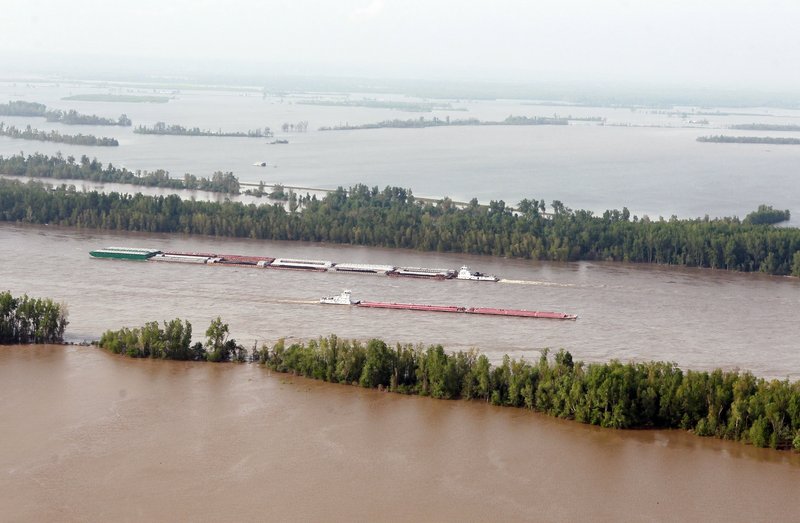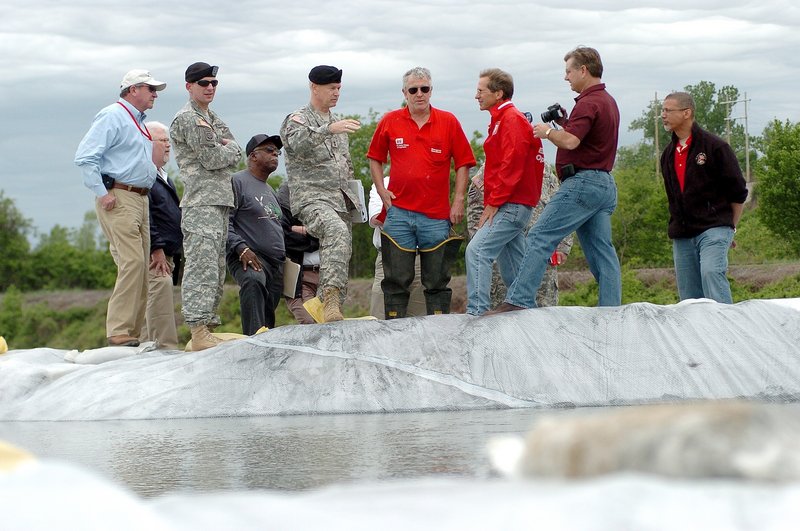SIKESTON, Mo. – At the confluence of the Ohio and Mississippi rivers, Maj. Gen. Michael Walsh faced a decision that would likely mean devastation on one side of the waters or the other.
The 55-year-old officer, whose nearly two decades of command in the Army Corps of Engineers includes a stint in Iraq and helping oversee the restoration of the Gulf Coast after Hurricane Katrina, decided Monday that the best course was to blow a massive hole in the Birds Point floodway levee in southeast Missouri.
Doing so was expected to drown 130,000 acres of rich farmland and destroy 100 homes. Opting not to could have meant wiping out the entire town of Cairo, Ill.
“Making this decision is not easy or hard,” Walsh said. “It’s simply grave — because the decision leads to loss of property and livelihood, either in a floodway or in an area that was not designed to flood.”
While waters and emotions have risen, the straight-talking Walsh has maintained a business-like demeanor. He met with people on both sides of the river, some of them angry or upset about the plan, which aims to relieve pressure on the flood wall at Cairo, a long-struggling community of 2,800 residents. In answering questions, he’s often cited statistics or protocol. And he’s shown empathy, if not emotion.
“I recognize all of your lives will be impacted,” he told one group of property owners in East Prairie, Mo., last week. “But these levees have never been under this pressure before.”
Even those opposed to the Corps’ plan appreciate how Walsh — who is responsible for managing the entire length of the Mississippi River valley, from Canada to the Gulf of Mexico — has handled the situation.
“The general has a very difficult decision to make relatively quickly,” Missouri Gov. Jay Nixon, whose administration opposed the plan all the way to the U.S. Supreme Court, said before the choice was made. “He understands the magnitude of the decision on his plate.”
Nearly everyone is already out of Cairo. Mayor Judson Childs ordered mandatory evacuation after a massive sand boil was discovered, creating fears of an uncontrolled levee break. Barges brought explosive devices to the Missouri site, about 130 miles south of St. Louis. The Corps said an initial series of explosions was expected after 9 Monday night.
Since the floodwaters began to rise to near record levels last week, rhetoric has sometimes been harsh from both sides of the river. Missouri officials not only condemned the idea of blasting the levee but filed suit to stop it. Childs last week implied racism was at play, saying Cairo — a community that is 70 percent black — was on the “verge of being the next Ninth Ward of New Orleans,” referring to damage caused by Hurricane Katrina.
If Walsh was feeling pressure, he was neither showing it nor talking about it. He declined interview requests for this story.
He said last week, though, that he would rather use the controlled levee break to ease the floodwaters than do nothing and risk seeing a levee burst or be topped elsewhere where more lives and less farmland were at risk, and insisted he’s not taking the decision lightly.
Walsh “has lived up to his reputation, Nixon said. “He’s very sharp and focused on the job at hand.”
The native of Brooklyn, N.Y., assumed his first command in San Francisco in 1994, moved to Sacramento, Calif., and then to Corps headquarters in Washington, eventually becoming chief of staff. In 2004 he took command of the division in Atlanta, then went to Iraq, where he was commander for the Corps’ Gulf Region Division. He took command of the Mississippi Valley division in 2008, which includes parts of 12 states and encompasses 370,000 square miles.
Until now, he’s kept a relatively low profile.
Send questions/comments to the editors.




Success. Please wait for the page to reload. If the page does not reload within 5 seconds, please refresh the page.
Enter your email and password to access comments.
Hi, to comment on stories you must . This profile is in addition to your subscription and website login.
Already have a commenting profile? .
Invalid username/password.
Please check your email to confirm and complete your registration.
Only subscribers are eligible to post comments. Please subscribe or login first for digital access. Here’s why.
Use the form below to reset your password. When you've submitted your account email, we will send an email with a reset code.